一般现在时变否定句的规则培训资料
- 格式:doc
- 大小:45.00 KB
- 文档页数:14
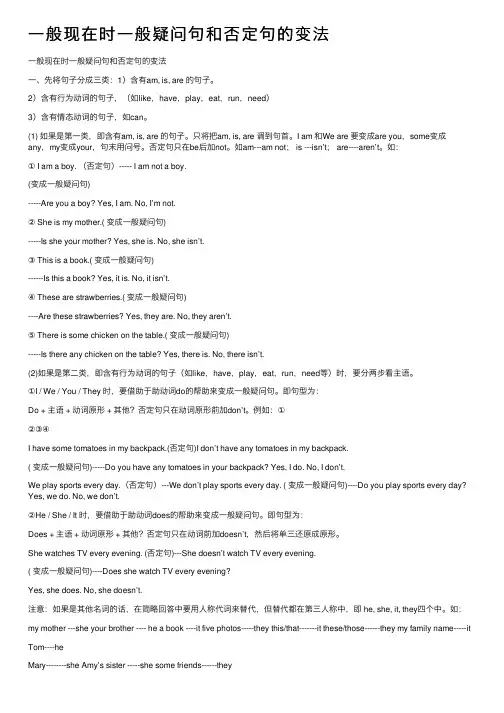
⼀般现在时⼀般疑问句和否定句的变法⼀般现在时⼀般疑问句和否定句的变法⼀、先将句⼦分成三类:1)含有am, is, are 的句⼦。
2)含有⾏为动词的句⼦,(如like,have,play,eat,run,need)3)含有情态动词的句⼦,如can。
(1) 如果是第⼀类,即含有am, is, are 的句⼦。
只将把am, is, are 调到句⾸。
I am 和We are 要变成are you,some变成any,my变成your,句末⽤问号。
否定句只在be后加not。
如am---am not; is ---isn’t; are----aren’t。
如:① I am a boy. (否定句)----- I am not a boy.(变成⼀般疑问句)-----Are you a boy? Yes, I am. No, I’m not.② She is my mother.( 变成⼀般疑问句)-----Is she your mother? Yes, she is. No, she isn’t.③ This is a book.( 变成⼀般疑问句)------Is this a book? Yes, it is. No, it isn’t.④ These are strawberries.( 变成⼀般疑问句)----Are these strawberries? Yes, they are. No, they aren’t.⑤ There is some chicken on the table.( 变成⼀般疑问句)-----Is there any chicken on the table? Yes, there is. No, there isn’t.(2)如果是第⼆类,即含有⾏为动词的句⼦(如like,have,play,eat,run,need等)时,要分两步看主语。
①I / We / You / They 时,要借助于助动词do的帮助来变成⼀般疑问句。
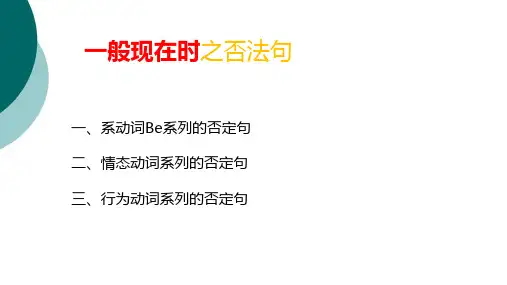

【导语】⼀般现在时,是⼀种语法形式。
表⽰通常性、规律性、习惯性、真理性的状态或者动作有时间规律发⽣的事件的⼀种时间状态。
那么在英语学习中⼀般现在时中含有实义动词的⼀般现在时如何变成否定句呢,⽆忧考给⼤家介绍的⼀般现在时中含有实义动词的句⼦,在变否定句前要分两种情况,不清楚的同学赶紧来看看!
第⼀种:如果主语是第三⼈称单数时,要在实义动词前加doesn't,后⾯的动词⽤原形。
具体是怎样的呢,我们通过⼏个例句来了解下:
1.He doesn't eat an apple. 他不吃苹果
2.Jim doesn't do his homework.吉姆没有做作业
3.Wang doesn't go to school.⼩王没去学校
第⼆种:如果主语不是第三⼈称单数时,只需在实义动词前加don't.具体是怎样的呢,我们通过⼏个例句来了解下:
1.I don't teach English.我不教英语
2.They don't go to school.他们没有去学校
3.We don't sing a song. 我们没有唱歌
好了,通过以上的⼏个例句,⼤家是否了解了含有be动词的⼀般现在时变成否定句的情况呢?
那么,接下来我们做⼏道题测试下你掌握得如何?
将下列句⼦改成否定句;
1. I like Jinan.
2.We go to school on Sunday.
答案:
1. I don't like Jinan.
2.We don't go to school on Sunday.。
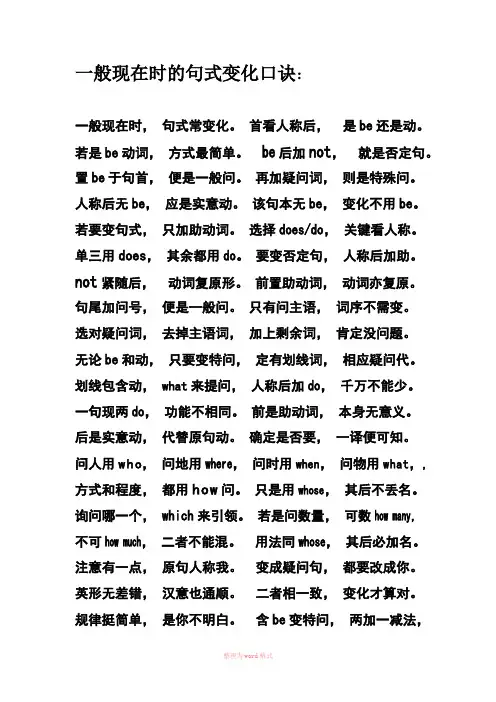
一般现在时的句式变化口诀:一般现在时,句式常变化。
首看人称后,是be还是动。
若是be动词,方式最简单。
be后加not,就是否定句。
置be于句首,便是一般问。
再加疑问词,则是特殊问。
人称后无be,应是实意动。
该句本无be,变化不用be。
若要变句式,只加助动词。
选择does/do,关键看人称。
单三用does,其余都用do。
要变否定句,人称后加助。
not紧随后,动词复原形。
前置助动词,动词亦复原。
句尾加问号,便是一般问。
只有问主语,词序不需变。
选对疑问词,去掉主语词,加上剩余词,肯定没问题。
无论be和动,只要变特问,定有划线词,相应疑问代。
划线包含动,what来提问,人称后加do,千万不能少。
一句现两do,功能不相同。
前是助动词,本身无意义。
后是实意动,代替原句动。
确定是否要,一译便可知。
问人用wh o,问地用where,问时用when,问物用what,,方式和程度,都用how问。
只是用whose,其后不丢名。
询问哪一个,which来引领。
若是问数量,可数how many,不可how much,二者不能混。
用法同whose,其后必加名。
注意有一点,原句人称我。
变成疑问句,都要改成你。
英形无差错,汉意也通顺。
二者相一致,变化才算对。
规律挺简单,是你不明白。
含be变特问,两加一减法,加疑问代词,句尾加问号,减疑问内容。
含动变特问,三加一减法,加疑问代词,紧跟助动词,句尾加问号,减疑问内容。
无论be和动,疑问代词后,词序都一般。
友情提示:本资料代表个人观点,如有帮助请下载,谢谢您的浏览!。
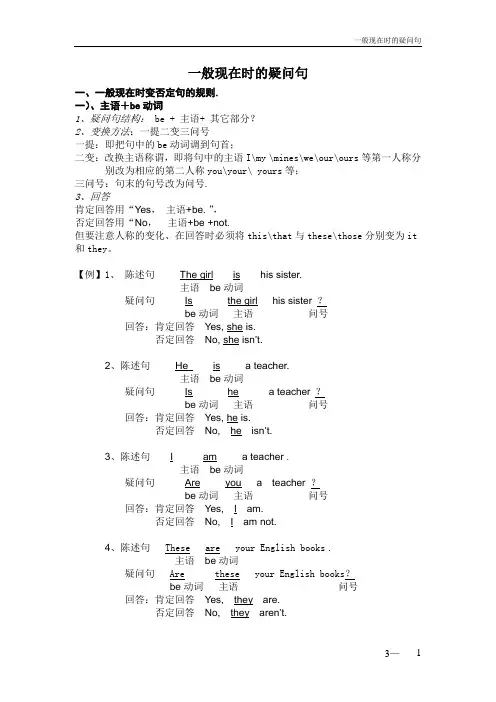
一般现在时的疑问句一、一般现在时变否定句的规则.一)、主语+be动词1、疑问句结构: be + 主语+ 其它部分?2、变换方法:一提二变三问号一提:即把句中的be动词调到句首;二变:改换主语称谓,即将句中的主语I\my \mines\we\our\ours等第一人称分别改为相应的第二人称you\your\ yours等;三问号:句末的句号改为问号.3、回答肯定回答用“Yes,主语+be.”,否定回答用“No,主语+be +not.但要注意人称的变化、在回答时必须将this\that与these\those分别变为it 和they。
【例】1、陈述句The girl is his sister.主语be动词疑问句Is the girl his sister ?be动词主语问号回答:肯定回答Yes, she is.否定回答No, she isn’t.2、陈述句He is a teacher.主语be动词疑问句Is he a teacher ?be动词主语问号回答:肯定回答Yes, he is.否定回答No, he isn’t.3、陈述句I am a teacher .主语be动词疑问句Are you a teacher ?be动词主语问号回答:肯定回答Yes, I am.否定回答No, I am not.4、陈述句 These are your English books.主语be动词疑问句Are these your English books?be动词主语问号回答:肯定回答Yes, they are.否定回答No, they aren’t.5、陈述句This is your English books .主语be动词疑问句Is this your English books?be动词主语问号回答:肯定回答Yes, It is.否定回答No, It isn’t二)、主语+情态动词1、疑问句结构:情态动词+ 主语+ 动词原形+ 其它部分?2、变换方法:一提二变三问号一提:即把句中的情态动词调到句首;二变:改换主语称谓,即将句中的主语I\my \mines\we\our\ours等第一人称分别改为相应的第二人称you\your\ yours等;三问号:句末的句号改为问号.3、回答肯定回答用“Yes,主语+情态动词.”,否定回答用“No,主语+情态动词+not但要注意人称的变化【例】1、陈述句I can speak English.主语be动词疑问句Can you speak English ?be动词主语问号回答:肯定回答Yes, I can.否定回答No, I can’t.三)、主语+实义动词1、疑问句结构当主语是第一人称;第二人称及第三人称复数及复数名词时:结构:Do+主语+实义动词+其他当主语是第三人称单数及单数名词时结构:Does+主语+实义动词原形+其他【例】1、陈述句He plays Ping-pang every day.主语义动词的第三人称单数形式疑问句Does he play Ping-pang every day.Does 主语动词原型回答:肯定回答Yes, he does.否定回答No, he doesn’t.四)、注意1、含有have和has的句子变成疑问句,把have和has看着实义动词,用do和does提问,但has要变成have【例】1、陈述句I have big eyes..疑问句Do you have big eyes?回答:肯定回答Yes,I do.否定回答NO,I don't.2、陈述句She has a small mouth.疑问句Does she have a small mouth?回答:肯定回答Yes,she does.否定回答No, she doesn't.2、见到some 变否定句时,要换成any.3、见到and 变否定句时,要换成or.4、见到too和also变否定句时,要换成either.5、见到already变否定句时,要换成yet。
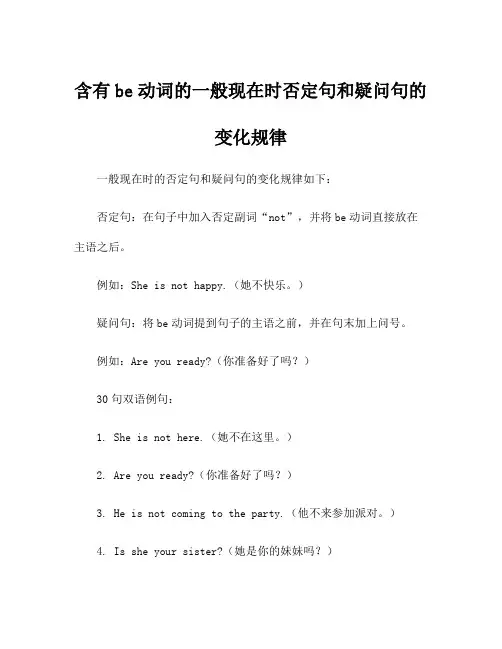
含有be动词的一般现在时否定句和疑问句的变化规律一般现在时的否定句和疑问句的变化规律如下:否定句:在句子中加入否定副词“not”,并将be动词直接放在主语之后。
例如:She is not happy.(她不快乐。
)疑问句:将be动词提到句子的主语之前,并在句末加上问号。
例如:Are you ready?(你准备好了吗?)30句双语例句:1. She is not here.(她不在这里。
)2. Are you ready?(你准备好了吗?)3. He is not coming to the party.(他不来参加派对。
)4. Is she your sister?(她是你的妹妹吗?)5. They are not happy with the result.(他们对结果不满意。
)6. Are you from Canada?(你来自加拿大吗?)7. It is not a secret.(这不是个秘密。
)8. Are they your friends?(他们是你的朋友吗?)9. We are not going to the beach.(我们不去海滩。
)10. Is it cold outside?(外面冷吗?)11. The food is not delicious.(这食物不好吃。
)12. Are you a student?(你是学生吗?)13. She is not feeling well.(她感觉不舒服。
)14. Is he a teacher?(他是老师吗?)15. They are not listening to the music.(他们不听音乐。
)16. Are they watching a movie?(他们在看电影吗?)17. We are not happy with the service.(我们对服务不满意。
)18. Is it raining outside?(外面在下雨吗?)19. The cat is not sleeping.(猫没有睡着。
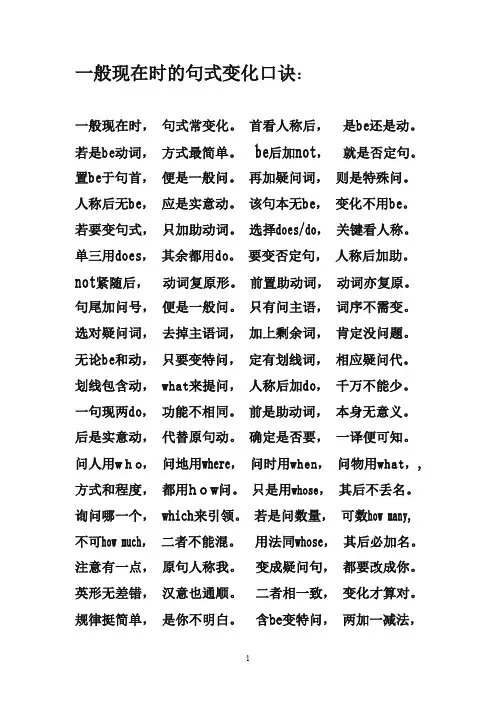
一般现在时的句式变化口诀:一般现在时,句式常变化。
首看人称后,是be还是动。
若是be动词,方式最简单。
be后加not,就是否定句。
置be于句首,便是一般问。
再加疑问词,则是特殊问。
人称后无be,应是实意动。
该句本无be,变化不用be。
若要变句式,只加助动词。
选择does/do,关键看人称。
单三用does,其余都用do。
要变否定句,人称后加助。
not紧随后,动词复原形。
前置助动词,动词亦复原。
句尾加问号,便是一般问。
只有问主语,词序不需变。
选对疑问词,去掉主语词,加上剩余词,肯定没问题。
无论be和动,只要变特问,定有划线词,相应疑问代。
划线包含动,what来提问,人称后加do,千万不能少。
一句现两do,功能不相同。
前是助动词,本身无意义。
后是实意动,代替原句动。
确定是否要,一译便可知。
问人用w h o,问地用where,问时用when,问物用what,, 方式和程度,都用h o w问。
只是用whose,其后不丢名。
询问哪一个,which来引领。
若是问数量,可数how many, 不可how much,二者不能混。
用法同whose,其后必加名。
注意有一点,原句人称我。
变成疑问句,都要改成你。
英形无差错,汉意也通顺。
二者相一致,变化才算对。
规律挺简单,是你不明白。
含be变特问,两加一减法,加疑问代词,句尾加问号,减疑问内容。
含动变特问,三加一减法,加疑问代词,紧跟助动词,句尾加问号,减疑问内容。
无论be和动,疑问代词后,词序都一般。
欢迎您的下载,资料仅供参考!致力为企业和个人提供合同协议,策划案计划书,学习资料等等打造全网一站式需求。
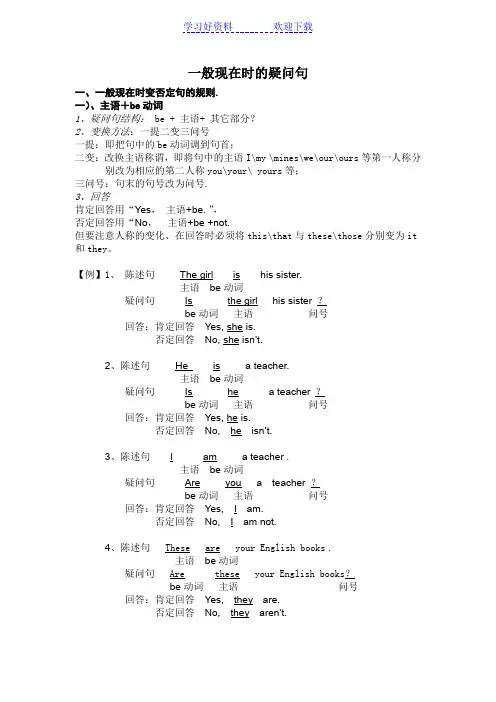
一般现在时的疑问句一、一般现在时变否定句的规则.一)、主语+be动词1、疑问句结构: be + 主语+ 其它部分?2、变换方法:一提二变三问号一提:即把句中的be动词调到句首;二变:改换主语称谓,即将句中的主语I\my \mines\we\our\ours等第一人称分别改为相应的第二人称you\your\ yours等;三问号:句末的句号改为问号.3、回答肯定回答用“Yes,主语+be.”,否定回答用“No,主语+be +not.但要注意人称的变化、在回答时必须将this\that与these\those分别变为it 和they。
【例】1、陈述句The girl is his sister.主语be动词疑问句Is the girl his sister ?be动词主语问号回答:肯定回答Yes, she is.否定回答No, she isn’t.2、陈述句He is a teacher.主语be动词疑问句Is he a teacher ?be动词主语问号回答:肯定回答Yes, he is.否定回答No, he isn’t.3、陈述句I am a teacher .主语be动词疑问句Are you a teacher ?be动词主语问号回答:肯定回答Yes, I am.否定回答No, I am not.4、陈述句 These are your English books.主语be动词疑问句Are these your English books?be动词主语问号回答:肯定回答Yes, they are.否定回答No, they aren’t.5、陈述句This is your English books .主语be动词疑问句Is this your English books?be动词主语问号回答:肯定回答Yes, It is.否定回答No, It isn’t二)、主语+情态动词1、疑问句结构:情态动词+ 主语+ 动词原形+ 其它部分?2、变换方法:一提二变三问号一提:即把句中的情态动词调到句首;二变:改换主语称谓,即将句中的主语I\my \mines\we\our\ours等第一人称分别改为相应的第二人称you\your\ yours等;三问号:句末的句号改为问号.3、回答肯定回答用“Yes,主语+情态动词.”,否定回答用“No,主语+情态动词+not但要注意人称的变化【例】1、陈述句I can speak English.主语be动词疑问句Can you speak English ?be动词主语问号回答:肯定回答Yes, I can.否定回答No, I can’t.三)、主语+实义动词1、疑问句结构当主语是第一人称;第二人称及第三人称复数及复数名词时:结构:Do+主语+实义动词+其他当主语是第三人称单数及单数名词时结构:Does+主语+实义动词原形+其他【例】1、陈述句He plays Ping-pang every day.主语义动词的第三人称单数形式疑问句Does he play Ping-pang every day.Does 主语动词原型回答:肯定回答Yes, he does.否定回答No, he doesn’t.四)、注意1、含有have和has的句子变成疑问句,把have和has看着实义动词,用do和does提问,但has要变成have【例】1、陈述句I have big eyes..疑问句Do you have big eyes?回答:肯定回答Yes,I do.否定回答NO,I don't.2、陈述句She has a small mouth.疑问句Does she have a small mouth?回答:肯定回答Yes,she does.否定回答No, she doesn't.2、见到some 变否定句时,要换成any.3、见到and 变否定句时,要换成or.4、见到too和also变否定句时,要换成either.5、见到already变否定句时,要换成yet。
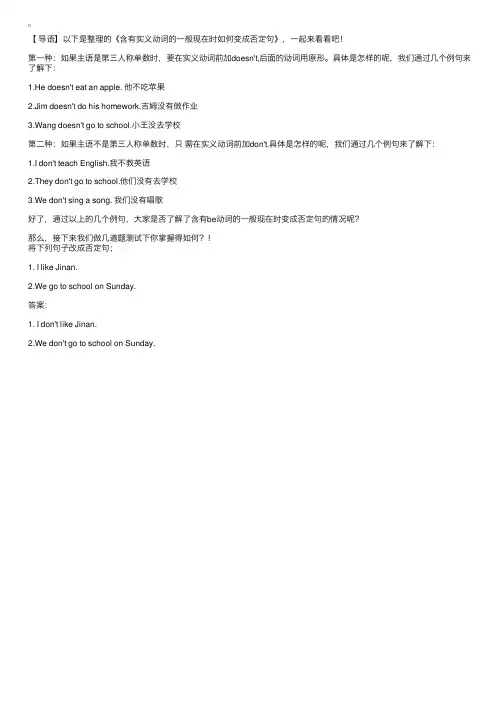
【导语】以下是整理的《含有实义动词的⼀般现在时如何变成否定句》,⼀起来看看吧!
第⼀种:如果主语是第三⼈称单数时,要在实义动词前加doesn't,后⾯的动词⽤原形。
具体是怎样的呢,我们通过⼏个例句来了解下:
1.He doesn't eat an apple. 他不吃苹果
2.Jim doesn't do his homework.吉姆没有做作业
3.Wang doesn't go to school.⼩王没去学校
第⼆种:如果主语不是第三⼈称单数时,只需在实义动词前加don't.具体是怎样的呢,我们通过⼏个例句来了解下:
1.I don't teach English.我不教英语
2.They don't go to school.他们没有去学校
3.We don't sing a song. 我们没有唱歌
好了,通过以上的⼏个例句,⼤家是否了解了含有be动词的⼀般现在时变成否定句的情况呢?
那么,接下来我们做⼏道题测试下你掌握得如何?!
将下列句⼦改成否定句;
1. I like Jinan.
2.We go to school on Sunday.
答案:
1. I don't like Jinan.
2.We don't go to school on Sunday.。

英语学习之一般现在时规则总结一、定义一般现在时是用来描述经常性、习惯性或普遍性的动作、状态或事实。
它表示的是客观存在的情况,不受过去或未来的限制。
二、规则总结1. 一般现在时的肯定句结构:- 主语 + 动词原形(第三人称单数加-s/-es)+ 其他成分例如:- I play basketball every day.(我每天打篮球。
)- He watches TV in the evening.(他晚上看电视。
)2. 一般现在时的否定句结构:- 主语 + do(es) not + 动词原形 + 其他成分例如:- I do not like coffee.(我不喜欢咖啡。
)- She does not study French.(她不学习法语。
)3. 一般现在时的疑问句结构:- Do(Does) + 主语 + 动词原形 + 其他成分?例如:- Do you play tennis?(你打网球吗?)- Does he drink milk every morning?(他每天早上喝牛奶吗?)4. 一般现在时的特殊情况:- 动词以辅音字母+y结尾,变y为i,再加-es。
例如:study → studies(学习)- 动词以s、x、sh、ch等音结尾,加-es。
例如:pass → passes(通过)- 动词以-o结尾,加-es。
例如:do → does(做)5. 一般现在时的使用时机:- 经常性、习惯性的动作或状态例如:I read books every night.(我每晚读书。
)- 描述普遍性的真理、规律或事实例如:The sun rises in the east.(太阳从东方升起。
)三、例句总结以下是一些例句,用来总结一般现在时的规则和用法:1. My sister eats breakfast at 7 o'clock every morning.(我的姐姐每天早上7点吃早餐。
)2. They often visit their grandparents on weekends.(他们经常在周末去看望他们的祖父母。
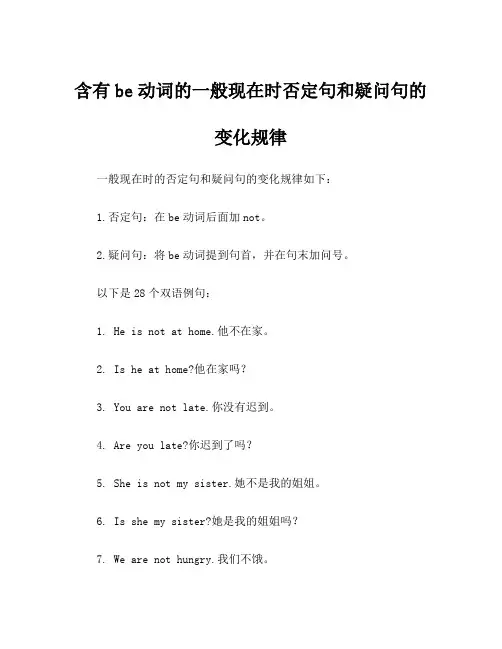
含有be动词的一般现在时否定句和疑问句的变化规律一般现在时的否定句和疑问句的变化规律如下:1.否定句:在be动词后面加not。
2.疑问句:将be动词提到句首,并在句末加问号。
以下是28个双语例句:1. He is not at home.他不在家。
2. Is he at home?他在家吗?3. You are not late.你没有迟到。
4. Are you late?你迟到了吗?5. She is not my sister.她不是我的姐姐。
6. Is she my sister?她是我的姐姐吗?7. We are not hungry.我们不饿。
8. Are we hungry?我们饿吗?9. They are not students.他们不是学生。
10. Are they students?他们是学生吗?11. It is not easy.这个不容易。
12. Is it easy?这个容易吗?13. John is not tired.约翰不累。
14. Is John tired?约翰累吗?15. The cat is not black.这只猫不是黑色的。
16. Is the cat black?这只猫是黑色的吗?17. My parents are not here.我的父母不在这里。
18. Are my parents here?我的父母在这里吗?19. The book is not interesting.这本书不有趣。
20. Is the book interesting?这本书有趣吗?21. The weather is not good.天气不好。
22. Is the weather good?天气好吗?23. The movie is not long.这部电影不长。
24. Is the movie long?这部电影长吗?25. The flowers are not beautiful.这些花不漂亮。
动词的一般现在时否定形式动词的一般现在时表示经常性、习惯性的动作或状态。
而否定形式则表示动作或状态的否定。
在英语中,构成动词的一般现在时否定形式通常需要使用助动词 "do" 的否定形式 "don't" 或 "doesn't" 加上动词的原形。
例如,我们可以将肯定句 "I play football every Saturday." (我每个星期六踢足球)转换成否定句 "I don't play football every Saturday." (我不每个星期六踢足球)。
同样地,第三人称单数的动词需要在否定形式中使用助动词 "does"的否定形式 "doesn't",例如 "He doesn't like swimming." (他不喜欢游泳)。
动词的一般现在时否定形式构成方法比较简单,但在实际运用时还需注意以下几点:1. 助动词 "do" 的否定形式 "don't" 和 "doesn't" 不可以省略,否则将改变句子的意思。
例如 "I don't play football every Saturday." (我不每个星期六踢足球)中的 "don't" 不可以省略,否则变成了断言 "I play football every Saturday." (我每个星期六踢足球)。
2. 动词的一般现在时否定形式常与时间状语连用,表示经常或习惯性的否定动作。
例如 "I don't eat meat." (我不吃肉)中的 "don't" 表示习惯性的否定动作。
否定句的变化规则一、含有be动词(am/is/are/was/were)的句子1. 规则- 直接在be动词后加not。
- 例如:- 肯定句:I am a student.- 否定句:I am not a student.- 肯定句:He is at home.- 否定句:He is not (isn't) at home.- 肯定句:They are happy.- 否定句:They are not (aren't) happy.- 肯定句:She was in the park yesterday.- 否定句:She was not (wasn't) in the park yesterday. - 肯定句:We were good friends last year.- 否定句:We were not (weren't) good friends last year.2. 注意事项- 在一般现在时中,am与第一人称I连用;is与第三人称单数(he/she/it 等)连用;are与第二人称you及复数(we/they等)连用。
- 在一般过去时中,was与第一人称I和第三人称单数(he/she/it等)连用;were与第二人称you及复数(we/they等)连用。
二、含有情态动词(can/could/may/might/must/should等)的句子1. 规则- 在情态动词后加not。
- 例如:- 肯定句:He can swim.- 否定句:He can not (can't) swim.- 肯定句:You could play football when you were young.- 否定句:You could not (couldn't) play football when you were young.- 肯定句:She may come tomorrow.- 否定句:She may not come tomorrow.- 肯定句:We must go to school on time.- 否定句:We must not (mustn't) be late for school.- 肯定句:You should study hard.- 否定句:You should not (shouldn't) waste your time.2. 注意事项- mustn't表示“禁止,不许”,有较强的命令语气。
六年级否定句知识点在英语学习中,否定句是我们必须要掌握的重要语法知识之一。
通过运用否定句,我们可以对肯定句的说法进行否定,表达相反的意思。
在六年级阶段,学生将进一步学习否定句的构成和使用方法。
本文将为大家详细介绍六年级否定句的相关知识点。
一、否定句的构成在否定句中,我们通常会使用一些特定的词汇来表示否定,比如“not”、“don’t”、“doesn’t”等。
具体构成方式如下:1. 一般现在时的否定句构成:主语 + do/does + not + 动词原形 + 其他成分例如:- I do not like ice cream.(我不喜欢冰淇淋)- He does not play football.(他不踢足球)2. 一般过去时的否定句构成:主语 + did + not + 动词原形 + 其他成分例如:- We did not go to the park yesterday.(我们昨天没有去公园)- She did not finish her homework.(她没有完成作业)3. 一般将来时的否定句构成:主语 + will + not + 动词原形 + 其他成分例如:- They will not visit their grandparents next week.(他们下周不会去看望祖父母)- I will not forget your birthday.(我不会忘记你的生日)4. be动词的否定句构成:主语 + am/is/are + not + 其他成分例如:- You are not my friend.(你不是我的朋友)- The book is not on the table.(书不在桌子上)二、否定句的使用方法在具体使用否定句时,我们需要注意以下几点:1. 如果句子中已经包含了助动词(如do、does、did、will)或be动词(am、is、are、was、were),则只需在助动词或be动词后面加上not即可。
一般现在时变否定句的规则一般现在时变否定句的规则.(a) 含有 am is are 的句子,变否定句时,只需在am is are 后加not.例1 This is a book.否定句 This is not a book .例2 I am a teacher .否定句I am not a teacher .例3 These are pens .否定句These are not pens .(b) 含有实义动词的句子,变否定句分两步。
(1)如果主语是第三人称单数时,要在实义动词前加doesn't,后面的动词用原形。
例1 He eats an apple.否定句 He doesn't eat an apple.例2 Jim does his homework.否定句 Jim doesn't do his homework.例3 Marry goes to school.否定句Marry doesn't go to school.(2) 如果主语不是第三人称单数时,只需在实义动词前加don't.例1 I teach English.否定句 I don't teach English.例2 They go to school.否定句 They don't go to school.例3 We sing a song.否定句 We don't sing a song.(c) 含有情态动词的句子,变否定句时, 只需在情态动词后加not.例1 I can dance.否定句 I can not dance.或 I can't dance.例2 They can speak English.否定句 They can not speak English.或 They can't speak English.例3 He must go home.否定句 He must not go home.或 He mustn't go home.例4 He must be on the playground.He can not be on the playground.析:当must be用来表示推测,有“一定”的含义时,否定式要用can not.例5 You must say something at the mecting.You needn’t say anything at the mecting.析:当“must+行为动词”用来表示“必须”的含义时,其否定式可用needn’t 或mustn't表示“不需要”,“不必”,语气委婉,must not表示“禁止”,“千万别”语气生硬。
例6 You may come in now.You mustn't come in now.析:may作为情态动词表示“可以”时,其否定式用must not,而不用may not.例7 He may watch TV .He mustn't watch TV.注意:(1) 见到some 变否定句时,要换成any.例1 I eat some apples.否定句 I don't eat any apples.例2 He has some books.否定句 He doesn't have any books.例3 He does his home work.否定句 He doesn't do his home work.(2) 见到and 变否定句时,要换成or.例1 There is some air and water on the moon.否定句 There isn't any air or water on the moon.例2 He has some brothers and sisters.否定句 He hasn't any brothers or sisters.例3 He eats apples and oranges.否定句He doesn’t eat apples or oranges.(3) 见到too和also变否定句时,要换成either.例1Tom goes to school too.否定句Tom doesn’t go to school either.too和also用于肯定句中时,否定句中用either替换。
(4 见到already变否定句时,要换成yet。
例1 He has had supper already.He hasn’t had supper yet.随着对谓语动词的否定,某些副词也要作相应的变动。
一般现在时精炼一将下列句子变否定句。
例1 I am a boy.例2 You are a girl.例3 He is a teacher.例4 Jim is English.例5 These are bikes.例6 Those are maps.例7 They are buses.例8 We are Chinese.二将下列句子变否定句。
例1 I’m a boy.例2 You’re a girl.例3 He’s a teacher.例4 It’s a pen.例5 These are some bikes.例6 Those are maps and pencils. 例7 They’re some buses and cars.例8 She is your teacher.三将下列句子变疑问句。
例1 I am a boy.例2 You are a girl.例3 He is my teacher.例4 Jim is our English.例5 These are some bikes.例6 Those are my maps.例7 They are some buses.例8 We are Chinese.四将下列句子变成疑问句。
例1 I’m a boy.例2 You’re a girl.例3 He’s my teacher.例4 It’s a pen.例5 These are some bikes.例6 Those are maps and pencils. 例7 They’re some buses and cars.例8 She is your teacher.五将下列句子变否定句。
例1 I teach English.例2 They go to school.例3 We sing a song.例4 He spells it.例5 She goes to school.例6 He does his homework..例7 They do their homework.例8 I do my homework.六将下列句子变否定句。
例1 He teaches my English.例2 They speak English and French.例3 We eat some apples.例4 Jim spells it.例5 She goes to our school.例6 He does some homework..例7 They do their homework.例8 We do some homework.七将下列句子变疑问句。
例1 I teach English.例2 They go to school.例3 We sing a song.例4 He spells it.例5 She goes to school.例6 He does his homework..例7 They does their homework.例8 I do my homework.八将下列句子变疑问句。
例1 He teaches my English.例2 They speak English and French.例3 We eat some apples.例4 Jim spells it.例5 She goes to our school.例6 He does some homework..例7 They do their homework.例8 We do some homework.九将下列句子变否定句。
例1 I can dance.例2 They can speak English.例3He must go home.例4 He must be on the playground.例5 You must say something at the mecting.例6 You may come in now.例7 He may watch TV .例8 We need speak English.十将下列句子变否定句。
例1 I can dance and sing.例2 They can speak some English.例3You must go home.例4 They must be on the playground. 例5He must say something at the mecting.例6 Jim may come in now.例7 They may watch TV .例8 We need speak English and English.十一将下列句子变疑问句。
例1 I can dance.例2 They can speak English.例3He must go home.例4 He must be on the playground.例5 You must say something at the mecting.例6 You may come in now.例7 He may watch TV .例8 We need speak English.十二将下列句子疑问定句。
例1 I can dance and sing.例2 They can speak some English.例3You must go home.例4 They must be on the playground.例5He must say something at the mecting.例6 You may come in now.例7 They may watch TV .例8 We need speak English and English.十三写出下列动词的第三人称单数形式。
1 go2 spell3 speak 4like 5teach6 Be7 are8 study9 have 10 do十四将下列名词变成复数。